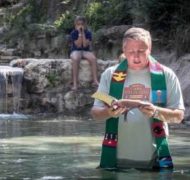Who Are the Ministers of Jesus Christ?
Daily Reflection / Produced by The High Calling
So Christ himself gave the apostles, the prophets, the evangelists, the pastors and teachers, to equip his people for works of service, so that the body of Christ may be built up.
Ephesians 4:11
Who are the ministers of Jesus Christ? As I explained in yesterday's reflection, most Christians would answer this question by pointing to the ordained leaders of their churches. The ministers, sometimes called priests, pastors, or preachers, are the officials who lead worship, pray, preach, visit the sick, oversee the church's program, and so forth. These are the people who are in "the ministry."
This common way of speaking is not supported in Scripture, however. For example, let's look closely at Ephesians 4:11-12. In this passage, we have clear identification of the kinds of people we would call ministers: apostles, prophets, evangelists, and pastor-teachers. But are they the ministers? Are they the ones who do the ministry of Christ?
No, not according to this passage. The NIV translation says that these leaders are "to equip his [Christ's] people for works of service" (4:12). That's a reasonable paraphrase, but it can blunt the sharp edge of the original language. A more literal translation is found in the ESV and the classic RSV, where it says that the leaders are "to equip the saints for the work of ministry." "Saints," according to New Testament usage, are not extra spiritual Christians. Rather, all who have put their trust in Christ as Savior and Lord are saints. The NIV rightly represents the inclusiveness of "saints" by using "his people." All of Christ's people are saints. And all of Christ's people are to be equipped.
Equipped for what? The NIV has "works of service." The ESV and RSV go with "the work of ministry." In the original Greek, "work" does appear in the singular (ergon). The word translated as "service" or "ministry" is diakonia. This is the standard Greek word that is usually rendered as "ministry." The NIV often translates diakonia as "ministry" (for example, Rom. 11:3; 2 Cor. 4:1; 5:18).
Thus, according to Ephesians 4:11-2, the leaders of the church are to equip the saints (all of Christ's people) for ministry. The leaders are not the primary ministers. Rather, the ministers are the people of God, who have been drafted into God's ministry, and who are to be equipped for their ministry by the leaders. When we call these leaders "ministers" or when we say that they have gone into "the ministry," we run the risk of obscuring the fact that, according to Scripture, all Christians are ministers ... including you.
QUESTIONS FOR FURTHER REFLECTION: How does the teaching of Ephesians 4:11-12 strike you? Is this familiar to you? Is it new? Does it excite you? Does it perplex you? Do you see yourself as a minister of Christ? If you were to see yourself this way, how might you live differently today?
PRAYER: Gracious God, as we seek to grasp your truth accurately, help us to see what your Word truly says. It seems that there is a wide gap between our common language for "ministry" and the teaching of Ephesians. Forgive us for obscuring what you have revealed to us. Forgive us for envisioning the church as a community in which a few professionals are the ministers.
Help us to see with new eyes what your church is to be. Help us to see our leaders as those you have given to us to equip us. Help us to see ourselves as your ministers and to live in light of this truth today. Amen.
Image courtesy of Laity Lodge Family Camp, one of our sister programs in the Foundations for Laity Renewal.






